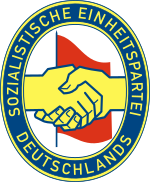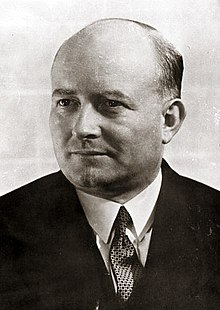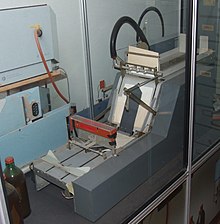Eastern Bloc politics
These governments contained apparent elements of representative democracy (such as the highest organ of state power, elections, and sometimes even multiple political parties) to conceal the process initially.
[10] The defining characteristic of communism implemented in the Eastern Bloc was the unique symbiosis of the state with society and the economy, resulting in politics and economics losing their distinctive features as autonomous and distinguishable spheres.
[21] Furthermore, the Eastern Bloc experienced economic mis-development by central planners resulting in those countries following a path of extensive rather than intensive development, and lagged far behind their western European counterparts in per capita Gross Domestic Product.
[25] At the war's end, concealment of the Kremlin's role was considered crucial to neutralize resistance and to make the regimes appear not only led by local people, but also to resemble "bourgeois democracies".
[30] At the same time, Soviet advisers were placed in government institutions, with higher concentrations in the army and the police, while trade agreements gave the USSR a preponderant influence in local economies.
[31] Stalin felt that socioeconomic transformation was indispensable to establish Soviet control, reflecting the Marxist-Leninist view that material bases—the distribution of the means of production—shaped social and political relations.
[18] In satellite states, after peace treaties were initially concluded, opposition was essentially liquidated, fundamental steps toward socialism were enforced, and Kremlin leaders sought to strengthen control therein.
"[36] The defining characteristic of communism implemented therein was the unique symbiosis of the state with society and the economy, resulting in politics and economics losing their distinctive features as autonomous and distinguishable spheres.
[18] Initially, Stalin directed systems that rejected Western institutional characteristics of market economies, democratic governance (dubbed "bourgeois democracy" in Soviet parlance), and the rule of law subduing discretional intervention by the state.
[37] The resulting states aspired to total control of a political center backed by an extensive and active repressive apparatus, and a central justification of ostensibly Marxist-Leninist ideology.
[41] The degree of leadership freedom varied, with Ceauşescu facing little debate, while Bulgaria's Todor Zhivkov could undertake actions such as forcing Bulgarian names on ethnic Turks without even discussing the matter.
[48] Party leader Klement Gottwald's early claims that Czechoslovakia was different from the rest of the Eastern Bloc created jealousy and additional danger later when Stalin was showing an almost paranoiac desire for unity and uniformity.
[49] In addition to connections with Tito or Yugoslavia, persons who had previously belonged to non-communist parties merged in the Bloc politics process were also at risk, as were members from a non-working-class background.
Once in the interrogation room, the inquisitors made no pretense about attempting to seek real evidence, making it clear that their only task was to extract a confession that would be used to convince other people of the defendant's guilt.
"[51] In another case, the Hungarian ÁVH secret police also condemned another party member as a Nazi accomplice with a document that had actually been previously displayed in glass cabinet of the Institute of the Working Class Movement as an example of a Gestapo forgery.
[58] After a purge in the military and the economic bureaucracy, in 1976, Albania implemented a rigidly Marxist-Leninist constitution that not only made the party the leading force in state and society, but also limited private property and forbade foreign loans.
[59] Isolating itself completely from the rest of the world, Albania embarked on a massive defense program, including the amassing of a huge arsenal of weapons and the construction of more than 700,000 concrete military bunkers for a country with only 3 million citizens.
[61] In such Communist systems, centralized and unelected state apparatuses, command economies, and scarcity or absence of independent civil associations specifically combined to tightly restrict the repertoire of action for those looking to defend their interests or press demands on the government.
[36] In addition to emigration restrictions, civil society, defined as a domain of political action outside the party's state control, was not allowed to firmly take root, with the possible exception of Poland in the 1980s.
[64] Accordingly, the suppression of dissidence and opposition was viewed as a central prerequisite for the security of Communist power, though the enormous expense at which the population in certain countries were kept under secret surveillance may not have been rational.
[69] A former Romanian Securitate leader stated:[69]This was achieved by a simple device: a factory, a local government department, a professional organization was given a quota of people to be weeded out, which might mean sacking, sending to the mines or handing over to the security police as class enemies under the accusation of whatever happened to be the fashionable crime.
[73] In Romania, Gheorghiu-Dej admitted that 80,000 peasants had been accused of siding with the class enemy because they resisted collectivization, while purged party elite Ana Pauker was blamed for this "distortion".
[72] Unlike the repressions under Nazi occupation, no ongoing war existed that could bring an end to the tribulations of the Eastern Bloc, and morale severely suffered as a consequence.
[67] After Stalin's death in 1953, in general, the profile of the secret police declined, and became less a means to instill terror than to preserve the existing distribution of political power, overall becoming more reactive than proactive.
[78] Mielke became the longest-serving state security chief in the Eastern bloc, and his relationship with the Soviet secret police dated back to 1931, when he had fled Germany for Moscow after murdering two Berlin policemen.
[79] All information acquired worldwide by the intelligence and security services in the Eastern bloc was stored in the Soviet computer SOUD (System of Joint Acquisition of Enemy Data).
[87] Its ranks swelled much more quickly after Eastern Bloc countries signed the 1975 Helsinki accords, which Erich Honecker viewed as a grave threat to his regime because they contained language binding signatories to respect "human and basic rights, including freedom of thought, conscience, religion, and conviction.
[90] Those questioned by the Stasi were forced to put special cloths under the arms that were later stored in sealed and numbered cans in a massive warehouse for later use by bloodhounds in the event of a manhunt.
[93][94] Following several leaders of a miner strike later dying of premature disease, it was later discovered that Securitate doctors had subjected them to five-minute-long chest X-rays in an attempt to develop cancer.
[104] The Tenth Department, however, could not monitor the large number of discontented citizens in the Eastern Bloc in the late 1980s, with the first significant breach coming Hungary when the government therein ordered the dismantling of fortifications and barbed wire barriers along its border with Austria in August 1989.












